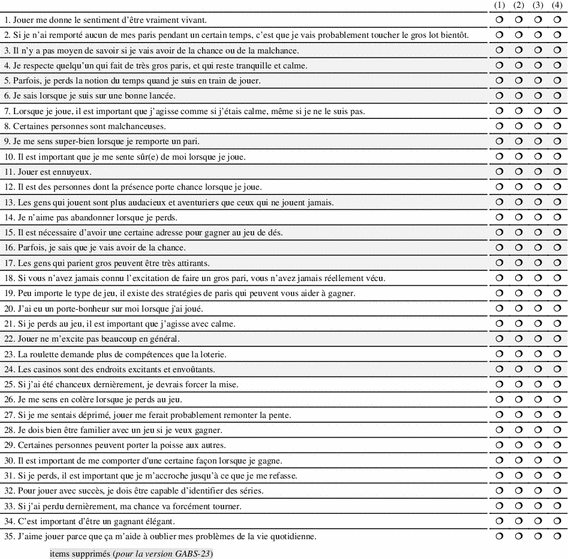Gambling Attitudes And Beliefs Survey
The purpose of this study is to examine the relationship between attitudes towards gambling, triggers for gambling, and the severity of the gambling problem of convicted offenders before their incarceration. Participants were recruited through transitional managers of prisons. There were 96 referrals, of which 66 participants completed the study. Results showed that there was a significant correlation between the Gambling Attitudes and Beliefs Survey (GABS) and the Inventory of Gambling Situations (IGS) and a significant correlation between the IGS and the EIGHT Gambling Screen. However, no significant correlation was found between the EIGHT Gambling Screen and the GABS. The results indicated that attitudes towards and beliefs about gambling did not directly influence the severity of the participants’ gambling problem. Attitudes and beliefs were more closely linked to their triggers for gambling, and these triggers carried more weight in the severity of their gambling problem. These results suggest that problem gamblers need assistance in dealing with their trigger situations for gambling as well as receiving a therapeutic programme to change their attitudes towards and beliefs about gambling.
In a broader market setting, we find that the magnitude of the negative lottery-stock premium is larger in high CPRATIO regions. Collectively, our results indicate that religious beliefs, through their influence on gambling attitudes, impact investors' portfolio choices, corporate decisions, and stock returns. Pathological gambling. The survey was relatively well received by Swiss GPs' professional associations in the French speaking area with 66% of acceptance to relay the information and the link to the online questionnaire. Another contrast between GPs beliefs and attitudes regarding PrG is that even if the majority of GPs knew the best.
Attitudes Beliefs And Behavior

Religion, Gambling Attitudes and Corporate Innovation 1. Introduction Do local culture and beliefs affect real economic activity? Considerable research finds that innovation is a key driver of firm value as well as overall economic growth (see, e.g., Solow (1957), Hall, Jaffe.